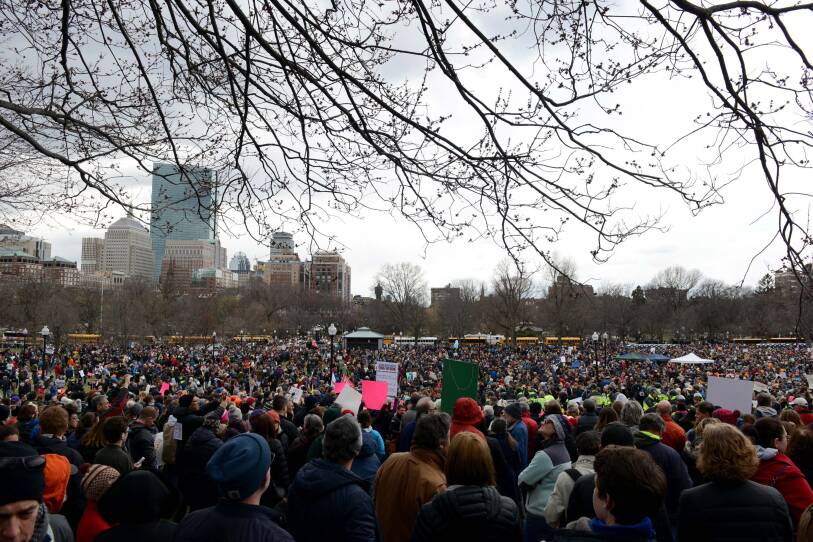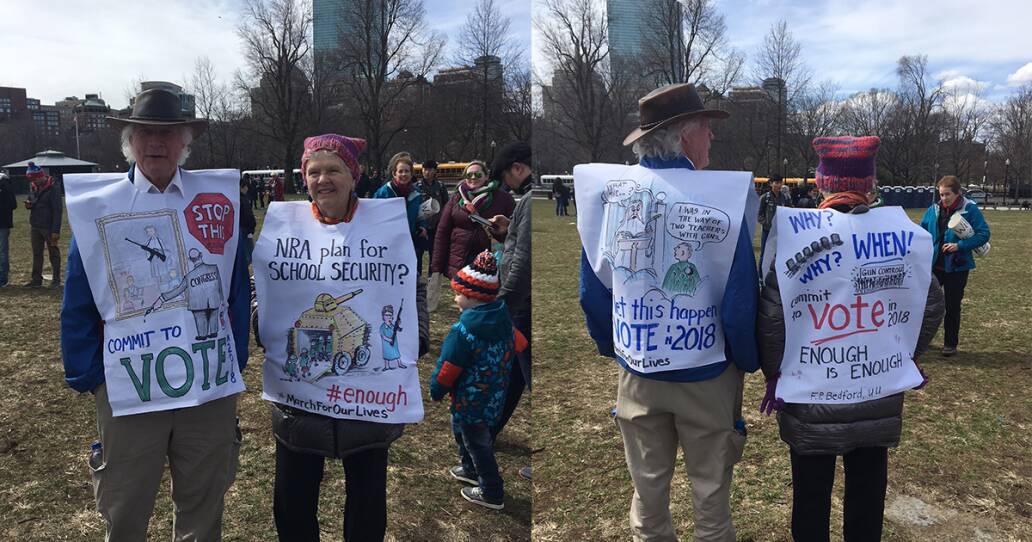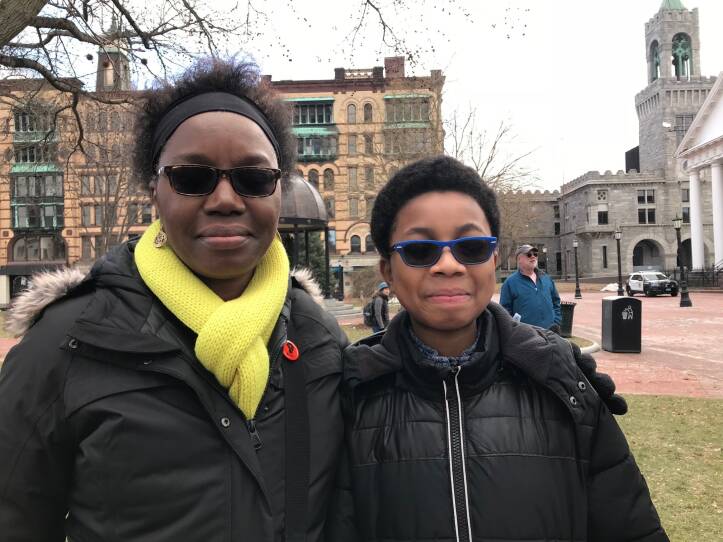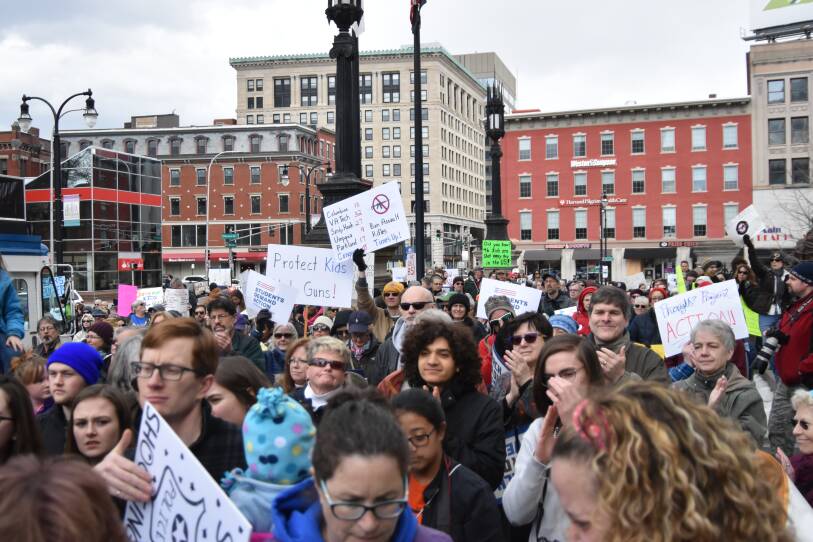Tens of thousands joined student organizers in cities across the state Saturday for marches and rallies protesting gun violence and promoting more effective gun control. Young organizers led protests in Boston, Worcester, Springfield, Hyannis, and Beverly, to parallel the national March For Our Lives protest in Washington, D.C.
The movement protesting gun violence, led by survivors of the Valentine’s Day shooting at Marjory Stoneman Douglas High School in Parkland, Fla. has gained national traction. Hundreds of thousands turned out across the country to join what some call the biggest youth-led demonstrations since 1967, when the world witnessed coast-to-coast opposition to the Vietnam War.
In Boston, students and other protesters marched from Madison Park High School in Roxbury to the Boston Common. The Boston Police Department estimated that up to 100,000 people participated. By early afternoon, the Common was a mass of humanity punctuated with signs reading, “Columbine should have been the last, not the first,” “School is for bettering our futures, not ending them,” and “You’ll never have the comfort of our silence again.”
The focus of the mostly student speakers was not only mass shootings, but street violence, suicide and police brutality.

Richard and Nancy Daugherty joined the protest on the Common wearing placards that read, “Commit to vote in 2018, enough is enough.”
“I’m so proud of our young people,” Nancy said.
Richard said that many of the high school seniors will be turning 18, and he hopes they vote. “We’ve gotta change this,” he said. “I don’t think our country is this mean.”

A number of people on the Common were registering protesters to vote, including pre-registering 17-year-olds.
A few hundred people participated in the march in Springfield, Mass., home to the headquarters of the gun manufacturer Smith and Wesson. Protesters called on Smith and Wesson’s CEO to cease contributing to the NRA and to stop selling assault rifles like the one used in Parkland to the general public. Marchers said they’ll keep putting pressure on the company.
Desiree Leaston, who grew up in Springfield, was there with her 12-year-old son.
“When we were growing up, you only had to worry about people smoking cigarettes, but now you’re worried about violence,” she said. “They need to be teaching kids, not worrying [that] someone’s going to burst through the door with a gun.”

As many as a thousand gathered at Worcester City Hall to support gun control and school safety. Some in the crowd had been in the same spot 50 years ago, protesting the Vietnam War.
But the day belonged to the young people there, who came from around the central Massachusetts.
Some waved signs with slogans like, "I want to become a statistician not a statistic!" and "One day, as a female, I hope to have as many rights as your guns." All of the speakers were students, and several recalled being as young as five years old when the Sandy Hook shooting happened. They reflected on growing up in an era in which school shootings have become commonplace. And while they called on elected officials to act to prevent more shootings, they brandished their future ability to vote as a threat public officials should take seriously.

On Cape Cod, about 1,500 people protested in Hyannis, and about 500 gathered in Falmouth. The crowd was calm and polite. Many families with young children attended. State representative Sarah Peake and Congressman Bill Keating made appearances.
Ben Ames, a senior at Beverly High School who attended the north shore march, says he thinks this movement will lead to tangible change.
“This country is made up of people, and by people acting on change, change will happen,” he said. “We can only hope.”
Not everyone was as optimistic. Joel Black, also a Beverly resident, says he wanted to lend his support, but he’s not terribly optimistic that the protests will lead to change.
“I think the legislators are not doing anything. I think the NRA has them in their pockets and nothing will be accomplished,” he said.
For the most part, counter-protesters avoided the anti-gun rallies. Only a handful showed up on the Common.
One of few Worcester counter-protesters was Conor Matthews, who said he attended because he wants to have a civil dialogue with those who are on the other side of the issue.
“Their anger is completely justified, their disgust with guns is completely justified, but I think their anger is placed in the wrong spot,” Matthews said. “The mass murders that they cite and talk about are far in the minority, and AR-15s are not the issue.”
Many of the state’s elected officials also joined Saturday's events. Senator Elizabeth Warren made appearances throughout the state, and Senator Ed Markey joined the Boston protest. He described what he saw to Jim and Margery on Boston Public Radio.
“You cannot see any part of the street that does not have people on it. As far as the eye can see on the left, and as far as you can see on the right, it is a sea of humanity protesting the NRA’s iron-clad grip on the Republican Congress,” he said.
But the focus was on the young people who organized events throughout the state and across the country.
In Washington, D.C., Emma Gonzalez, one of the most well-known survivors of the shooting at Marjory Stoneman Douglas High School, gave a speech that lasted approximately 6 minutes and 20 seconds, mirroring the amount of time the gunman spent shooting her schoolmates last month. She opened by reading the names of her classmates who were killed, and then she stood in silence. A timer beeped, marking that 6 minutes and 20 seconds had passed.
“Fight for your lives,” Gonzalez said, “before it’s someone else’s job.”
Craig LeMoult, Phillip Martin, Maggie Penman, Adam Reilly, Sarah Tan, and Bianca Vasquez Toness contributed to this report.





